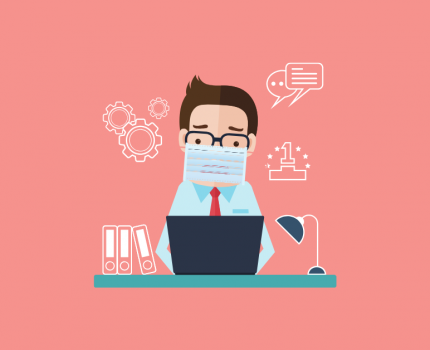Ethical issues of ICT4D in the context of COVID-19.
Estimated reading time: 4 minutes, 57 seconds.

Maximizing utility while minimizing harm is one of the goals of Information Communication Technology (ICT) when addressing inequalities in the context of the Global North and the Global South. The founder of the utilitarian approach, Jeremy Bentham, developed the idea of maximizing positive outcomes while minimizing negative outcomes long before the use of digital technology. The focus is centered upon whether the benefits outweigh the costs for a potentially large group of people. How does this apply to the use of ICT4D during the global pandemic period? How does this affect Privacy of individuals?
The benefits
Digital for Development […] refers to the conscious design and application of digital tools explicitly for development outcomes and impact. Initiatives in this category include digital apps and platforms designed for development including the thousands of eHealth, mHealth, edtech, fintech, civic tech, eAgriculture and other ICT4D initiatives.
Tony Roberts, 2019
Technology, in the context of Digital for Development, is therefore an essential tool for people to engage and receive important health and safety information during a global pandemic. ICT4D Conference Webinar Series on April 21, 2020 showed that lessons learned from the West Africa Ebola outbreak about the effective ways of using digital technologies are critical to help countries and health agencies. Such technologies include using mobile innovations for disease tracking and utilizing digital tools to prepare community and health workers for emergencies.
The right message, at the right time, from the right person can save lives in an emergency.
CERC, 2017
This is not a new quote in the field of Crisis and Emergency Risk Communication (CERC), and ICT plays a powerful role in disseminating the right message at the right time from the right source of information. As misinformation, disinformation and false rumors might cause fatal results during the global COVID-19 crisis, accessing accurate and timely information can be crucial for the successful response and preparedness for COVID-19, specifically among displaced people. To minimize false rumors, it is vital to disseminate accurate information by being first, being right and being credible.
In the early periods of 2020, the National Democratic Institute went to Taiwan to film a short documentary about how g0v (a decentralized civic tech community in Taiwan) developed some digital tech tools that helped to combat the spread of foreign disinformation in the general election (Ruetzel, Otunga, Heller, & Welborn, 2020). After this, the civic technologists of g0v have applied these strategies for their defense against COVID-19 related disinformation (Ruetzel et al, 2020). While false information can cost lives, accurate information with the aid of digital technology can make a serious impact in emergency situations. Powerful tools to communicate and share situational awareness are important to adapt to the pandemic.
Here are some examples of the benefits of ICT4D. The most frequently used tech approaches during COVID-19 are: remote monitoring and management, online education/learning platforms, community awareness building through automated text messaging (SMS), phone calls (IVR), and hotlines (CRS, 2020). For instance, Nigeria began to track COVID-19 with CommCare, which helps with contact tracing and case investigation. Next to this, another example is Liberia’s use of mHero, a two-way communication platform that connects ministries of health with health workers in the field which allows real-time information exchange and more effective action towards COVID-19 (Vota, 2020).

The drawbacks
When we dive into the negative aspects of ICT4D, we can argue that we cannot know for certain how personal data is collected for health-related issues in the long term or whether personal data will be shared with the employers for the safety of the business organizations. Despite the fact that digital technologies help to reduce the potential spread of COVID-19, we cannot know for certain whether the government agencies will use these tools to only track the cases of virus in the long run. Therefore, concerns about potential privacy violations including the traces of an individual’s friends, associates and travels are frequent since thi is sensitive information that is centrally collected and stored (Taylor, Sharma, Martin & Jameson, 2020).
Contact-tracing programs do public good, as they can reduce the risk and illness or deaths while benefiting the well-being of the public. Yet, as these technologies reveal our whereabouts, they collide with data privacy laws. The Chair of the European Data Protection Board emphasizes that the existence of a pandemic is not a reason to provide restriction on the rights of data subjects (EDPB, 2020a). The guidelines published by the EDPB (2020b, p.3) “clarify the conditions and principles for the proportionate use of location data and contact tracing tools, for two specific purposes:
using location data to support the response to the pandemic by modelling the spread of the virus so as to assess the overall effectiveness of confinement measures;
contact tracing, which aims to notify individuals of the fact that they have been in close proximity of someone who is eventually confirmed to be a carrier of the virus, in order to break the contamination chains as early as possible.”
EDPB (2020b, p.3)
This is done in order to safeguard the public health objective. Thus, when an individual voluntarily agrees to the use of a contact tracing app, their personal data will be available solely for health-related issues. Yet, this includes sharing personal information or contacts for contact tracing purposes in the case of individuals who have been in close contact with someone who is confirmed positive for COVID-19. This information, therefore, can be used to trace those people and notify them about the results. Some individuals might believe that this is an example of invasion of privacy, as they are required to share personal information about their lives.
Another thought about privacy: the personal data will still be available on the systems after the pandemic, which might be an issue of concern. The questions then arise: Is a utilitarian approach the right approach? Will the benefits outweigh the costs in the long run? Should the health of the public outweigh the privacy of individuals?
This post is written by Aylin Karaarslan. Find out more about the authors of this blog.
References
Catholic Relief Services (CRS) (May 15, 2020). ICT4D and COVID-19: Digital Tools Help Programs Respond and Adapt to the Pandemic. Retrieved from https://www.crs.org/our-work-overseas/research-publications/ict4d-and-covid-19
Centers for Disease Control and Prevention (CERC) (May 15, 2017). First Message in a Crisis. Retrieved from https://emergency.cdc.gov/cerc/cerccorner/article_042617.asp
EDPB (June 3, 2020a). Thirtieth Plenary session: EDPB response to NGOs on Hungarian Decrees and statement on Article 23 GDPR [Press release]. Retrieved from https://edpb.europa.eu/news/news/2020/thirtieth-plenary-session-edpb-response-ngos-hungarian-decrees-and-statement-article_en
EDPB (April 21, 2020b). Guidelines 04/2020 on the use of location data and contact tracing tools in the context of the COVID-19 outbreak. Retrieved from https://edpb.europa.eu/sites/edpb/files/files/file1/edpb_guidelines_20200420_contact_tracing_covid_with_annex_en.pdf
Roberts, T. (August 9, 2019). Digital Development: what’s in a name?, Appropriating Technology. Retrieved from http://appropriatingtechnology.org/?q=node/302
Ruetzel, S., Otunga, J.G., Heller, A., & Welborn, V. (May 5, 2020). Digital Tech to Help Fight COVID-19 Misinformation [Webinar]. ICT4D Conference Webinar Series. https://solutionscenter.nethope.org/webinars/view/digital-tech-to-help-fight-covid-19-misinformation
Taylor, L., Sharma, G., Martin, A. & Jameson, S. (2020). Data Justice and COVID-19: Global Perspectives, Meatspace Press.
Vota, W. (March 25, 2020). Three Early Digital Health COVID-19 Response Success Stories. Retrieved from https://www.ictworks.org/digital-health-covid-response-success-stories/#.X1pkpWf7TOQ

